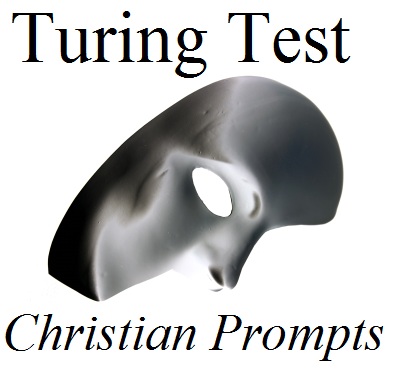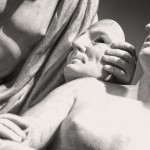This is part of the 2015 Ideological Turing Test series, where Christians and non-Christians test how well they understand one another. In this first round, Christians answer the prompts honestly, and atheists try to answer them as they expect the Christians to. Your job is to see if you can spot the difference. You can find all posts about the 2015 Ideological Turing Test here.
Below are answers to the question: What sin (if any) lies at the root of all other sin? And why?
Just make sure you fill out the quiz before you look at the comments! They’re open for speculation and discussion of the clues you think you’ve spotted.
Each contestant’s entry is followed by their bio, hidden by rot13.
1) The Fall of Man is the root of all sin. God very clearly told Adam and Eve that they could eat of any tree in the garden except the Tree of the Knowledge of Good and Evil. Eve sinned and for that sin all humanity deserves Hell, but we can be saved from Hell by following Jesus as our Lord and Savior. God loves us and wants us to be in Heaven with Him, that is why he sent Jesus to prepare the way for us and wash away our sins if we accept him.
V’z Qnavryyr Zhfpngb, Pbzzhavpngvbaf Znantre sbe Nzrevpna Ngurvfgf. V’z n cebsrffvbany pvivy-evtugf npgvivfgf svtugvat sbe rdhnyvgl sbe ngurvfgf naq V’z uneqpber nagv-eryvtvba. V’z n sbezre cebsrffvbany cenvfr & jbefuvc zhfvpvna naq rinatryvpny Puevfgvna, orsber V orpnzr na ngurvfg. V’z nyfb n genaf jbzna naq tnl, vs gung znggref.
2) Honestly: I don’t know. I have some thoughts and questions, but nothing more.
Some people would say pride is the sin that lies at the heart of other sins, but I know people can sin when they humble themselves before another person or before an idea or before an imperfect image of God. So it cannot be pride. The most common orthodoxy, I think, is disordered love: loving things in the wrong order or ratio. That seems compelling. But is it sin? I do not know that we choose what we love; we may encourage ourselves to love something or hate something, but first we must want to do so, and we do not choose what we want to love. Further, in this world, even if we love correctly, we are bound up in systemic injustices; whatever we do, our actions cause some evil. Do we not then sin, even if we love correctly? Or is it not sin if you choose the least evil you know?
I have been assuming that sin is volitional; that sin is only sin if you are responsible for it. But I am skeptical of the free will/determinism debate and its terms. If we are free, we aren’t especially free. Maybe sin, then, is just our state of Fallenness, of having chasms between yourself and God, the world, and all other people, and between parts of yourself and parts of yourself. But whence those chasms? As I said: I don’t know.
Zl unaqyr vf Puevfgvna U. Pnanqvna. Yvoenel fghqrag, jvgu ON, ZN va Ratyvfu yvg. Nggraq na Natyvpna puhepu; onpxtebhaq jvgu Yhgurena, Natyvpna, naq aba-qrabz puhepurf. Erpragyl vagb crefbany rcvfgrzbybtl. Pbaprearq jvgu gur enqvpny Bgurearff bs Tbq, gur jbeyq, bgure crbcyr, naq zlfrys; nyfb, jvgu ybivat gur Bgure nf Bgure. Qvfyvxrf pncvgnyvfz naq zbbq qvfbeqref. Yvxrf navznyf, cynagf, rgp. N Ghzoye: uggc://jrrxyl-jbaqre-oybt.ghzoye.pbz/.
3) Pride, defined as a desire for asserting oneself as different, better, special: not wanting to be loved in the way God loves us but wanting to be admired instead. All sin consists in taking oneself out of alignment with the natural order of things – “spoiling the pattern out of spite” as Auden says – and the reason we do that is to assert our separateness from God. All the hard work of obeying rules is because of that primordial sin, which means we can’t do good lightly, like Adam and Eve before the Fall, or the saints, or Christ.
Erprag pbaireg gb Pngubyvpvfz, pbairegrq gb Puevfgvnavgl sebz ngurvfz (Uvaqh phygheny onpxtebhaq) va 2007
4) The root of all sin is man’s sinful nature, but if I had to identify a particular *sin* that lies at the root of all others, it would be pride. The first step away from sin is recognizing our own fallenness and our desperate need of Christ in guiding us away from it. That humility opens a door for Christ in our hearts. His is a painful, blinding, searing light, which is why we turn away from it. We see the pale reflection of that light in ourselves and convince ourselves that we have no need for the true light, of that painful healing. Pride leaves us to wallow in our depravity, denying ourselves salvation and creating misery for ourselves and others.
27 lrnef byq, juvgr, znyr, Oenmvyvna, ghgbe, jevgre naq genafyngbe. Tenqhngrq sebz Lnyr jvgu n ON va Ratyvfu. Pbafvfgrag VASC jvgu n graqrapl sbe qrcerffvba. Abg terng ng haqrefgnaqvat flzobyvp flfgrzf, dhvpx gb tenfc shmml pbaprcgf. Onq ng jvyycbjre. Aba-Puevfgvna.
5) Not loving the Lord above all else. Someone who loves themself above the Lord will be selfish and hurt those around them; someone who loves others above the Lord will lose sight of the big picture and wind up hurting even those whom they love.
Ntabfgvp envfrq yvoreny Oncgvfg
6) Well, IIRC, “pride” and “cupidity” are the two scripturally sanctioned answers. If we wanted to synthesize them, we might say that pride, i.e. desiring a privileged position, is a kind of cupidity, i.e. desiring the things of this world; or, vice versa, that cupidity, i.e. claiming authority over parts of creation, is a kind of pride, i.e. claiming equality with God. I’m not particularly attached to either of these ways of putting it and I’m not sure it matters.
Leaving aside scripture, here’s my favorite an idiosyncratic way of putting it: humans are finite beings who naturally desire the infinite, and sin results from the attempt to grasp the infinite through our own power. Cupidity results from the delusion that endless accumulation can lead to infinite riches; pride, from the delusion that being #1 is the same as being the origin of the very idea of counting.
N obea-a-envfrq Ebzna Pngubyvp jub nggraqrq n Pngubyvp yvoreny negf havirefvgl, V’z abj trggvat n CuQ (sebz n frphyne fpubby) va yvgrengher.
7) The textbook answer is Pride, but I have always felt like the real answer is Greed. By Greed I mean hedonism of all varieties. To behave selfishly doesn’t require intellectually believing oneself to be superior to others necessarily, but an unexamined preference for serving oneself. Hedonism is why we allow ourselves go to Starbucks every week instead of giving that money to charity. Hedonism is why feeds our consumerism, our spiritual poverty, and our unwillingness to show vulnerability.
V nz na ngurvfg. V jnf envfrq aba-qrabzvangvba Puevfgvna naq ybfg zl snvgu fbzrgvzr va zvqqyr fpubby. V jnf pybfrgrq sbe frireny lrnef orsber pbzvat bhg gb zl fhecevfvatyl fhccbegvir snzvyl. V nz n juvgr znyr va n CuQ cebtenz sbe culfvpf naq V nafjre dhrfgvbaf nobhg ngurvfz sbe n jrofvgr pnyyrq NyyRkcregf.
Go on and make your guesses! Which of these were written in earnest, and which were someone’s best approximation of how someone across the religious divide would answer?

















